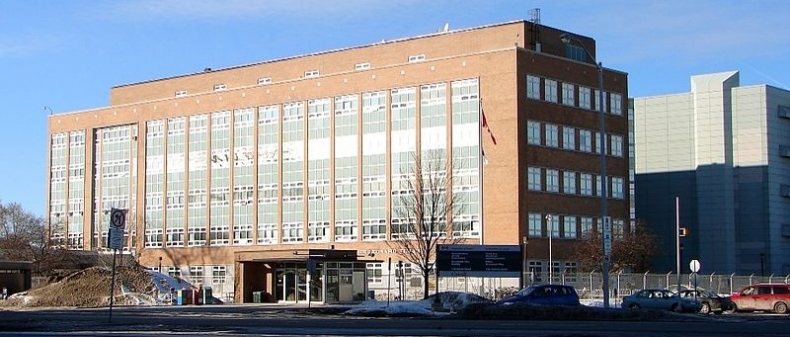
Canadians often have to wait for things that have already arrived in the US to make their way north of the border. As with MTV, a decent Netflix selection, or national independence, it has been several months of revelations into the NSA’s questionable practices before Canada’s own spy agency, Communications Security Establishment Canada, has been similarly damned by its own slideshow.
The slides, leaked to American journalist Glenn Greenwald by whistleblower Edward Snowden, and aired on Brazilian television, exposed CSEC, which operates under the authority of the Minister of National Defence, for spying on the communications of Brazil’s Ministry of Mines and Energy using metadata gathering software named Olympia. While a massive discovery of oil off the coast of the South American nation may prove to be competition for Alberta’s oil sands, Canadians could be excused if they expect an answer to NDP defence critic Jack Harris’ question, “What national security interest was at stake here?”
The Anti-Terrorism Act mandates CSEC with acquiring foreign signals intelligence, protecting Canada’s electronic information, and assisting federal law enforcement and security agencies in the gathering of communications data. Former CSIS deputy director Ray Boisvert claims, that while working closely with CSEC, they “were all too busy chasing bad guys that want to kill people,” to be up to anything else. While we can thank the former spy for speaking to us about complex issues as if we were children, if that is so, perhaps we should really be asking what sinister plots the Ministry of Mines and Energy has been hatching.
Thomas Mulcair disagrees. In his trademark style of half moral outrage, half truth, he proclaimed “the evidence is quite clear that CSEC has been complicit in industrial espionage, and it’s totally unacceptable.” Brazilian President Dilma Rousseff, still seething over embarrassing revelations of the NSA spying on her own communications and that of state-owned oil firm Petrobras, was slightly more diplomatic, stating that, “the spying could be a clear case of industrial espionage.” (Emphasis added) Whether it is or it isn’t is a question that cannot be answered without details which the public, the press, and most of Parliament are not privy to.
But the optics are not good. A recent report by The Guardian has added to the growing body of circumstantial evidence when it revealed that CSEC, along with CSIS and the RCMP, have been giving representatives of Canadian energy firms with security clearances biannual classified briefings. There is no indication that intelligence acquired through espionage was shared at these meetings, but the National Resource Ministry touted these affairs as an opportunity for participants to share information “off the record.” The meetings were ostensibly for discussing threats to energy infrastructure. However, as The Guardian points out, the federal government classifies environmental activists as security threats; so what was being discussed in these classified sessions?
Stephen Harper, always loath to break with tradition, has offered no explanation. Aside from expressing his concern over the scandal, and assuring us he has been “reaching out proactively” to the Brazilian government, the Prime Minister pointed out that a watchdog does exist for the spying agency. John Forster, CSEC chief, similarly declined to answer to the allegations, only to reassure us that his agency does not target “Canadians at home or abroad… nor do we target anyone in Canada.” Defence Minister Rob Nicholson has essentially said the same thing. That’s good to know, but it offers nothing to those wondering why Canada is spying on a friendly nation, or if our spy agencies are colluding with Canadian energy firms.
It is nothing more than misdirection. The government is hoping that unproven allegations of industrial espionage and concerns over Canada’s respect for Brazil’s national sovereignty will blow over with time, and unlike previous revelations originating from Snowden’s collection of embarrassing facts, Canadians have nothing to fear as far as their privacy is concerned. While it is true that the spy agency has a dedicated independent watchdog, the CSEC Commissioner, it is unclear how the office’s mandate is relevant to the current allegations. The commissioner is tasked with monitoring CSEC activities to ensure that they comply with ministerial direction, and Canadian law. Outgoing commissioner Robert Décary concluded his annual report [PDF] by stating, “I can say with pride and confidence that CSEC is truly being watched.” Décary was largely satisfied with CSEC’s adherence to Canadian law; but the report, tabled back in June before the recent controversy, dealt mainly with the privacy of Canadian citizens and said nothing of cooperation with the private sector.
Nor did Décary’s report give CSEC an unequivocal pass, and did indicate that in certain circumstances, the spy agency’s records were incomplete, and he could not determine if it acted illegally or not. He also expressed deep disappointment “at the lack of action by the government, which is no longer in a minority situation, to address the ambiguities identified by my predecessor and myself.” Prior to Décary’s time in the office, Charles Gonthier raised concern over mass surveillance methods removing the separation between foreign and domestic surveillance, the latter of which CSEC is prohibited by law from engaging in.
The Federal Privacy Commissioner, Jennifer Stoddart, meanwhile, has called for greater oversight by parliament over all agencies with a security mandate and offered to assist the CSEC commissioner when the NSA leaks first came to light. Décary’s executive director pointed out that Stoddart’s staff lacks the security clearance to be involved. One man who did have the clearance to formulate an informed opinion, however, was former CSEC chief John Adams. He too has called for greater transparency and parliamentary oversight.
CSEC is also junior partner in the 5 Eyes community of intelligence agencies with its counterparts in the United States, the United Kingdom, Australia, and New Zealand. Their cooperation involves sharing intelligence, technology, operational assistance, and though they have pledged to not spy on each other, it remains an open question of whether or not they spy for each other, collecting data on one another’s citizens to circumvent privacy laws. CSEC is forbidden by law to subcontract the invasion of privacy of Canadian citizens, but other government agencies may not be so constrained. The CSEC commissioner’s report on the nature of cooperation amongst the 5 Eyes is not due until 2014.
There should be no question that a spy agency needs its secrets. Government surveillance has an important role in a world where national security is shifting away from countering the existential threats posed by nuclear powers, and toward the international police work of combatting religious and ideologically motivated mass murderers who demonstrate almost as little regard for their own lives as they do for their victims.
That CSEC is gathering intelligence with no clear bearing on national security or the War on Terrorism should be a cause for concern, however. The most recent leak challenges the standard defence of government surveillance which seeks to frame the conversation as a trade-off between privacy and security. That some may wish to sacrifice some of the former for the sake of the latter is, right or wrong, an understandable position to take. While one is statistically unlikely to be the victim of a terrorist attack, scenes of carnage set against backdrops composed of the familiar props of western civilization – a busy street, a bus, a skyscraper – can elicit strong emotional reactions. Though access to resources may rightly be considered a matter of national interest, it is questionable that an informed electorate would consent to authorizing a government agency to operate with inadequate accountability, which may or may not be spying on citizens (though it certainly has that capability), all in the name of security, while working to ensure that domestic mining companies prospered abroad.
Of course, we do not know if our communications are being monitored, and we do not know that CSEC has been actively assisting Canadian corporations with intelligence for any purpose beyond a legitimate concern for security. We don’t know much of anything really, other than the fact that the latest revelations paint an ugly picture; and while the secrets of a spy organization must, by necessity, be closed off from public scrutiny, recent developments drive home the fact that Canada needs an effective mechanism to ensure that our intelligence organizations are operating according to the laws and values of the nation.
____
Anthony Matijas lives and writes in Toronto. Follow him on twitter at @A_Matijas.
For more, follow us on Twitter at @torontostandard and subscribe to our Newsletter.














